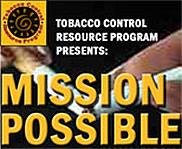| SECOND-HAND SMOKE HARMS EVERY BODY | ||
Second-hand smoke the cloud that can harm By Veronica Baeza, MPASmoking has been recognized as a major cause of preventable disease and death for at least 40 years. But in the past 20 years a growing body of evidence has shown that exposure to second-hand smoke (SHS) is also a threat to health. 38,000 people in the United States die of second-hand smoke-attributable illness every year. The presence of toxic and carcinogenic components in second-hand smoke in the hair and body fluids of nonsmokers is as extensive as in active smokers. Numerous studies have examined the associations between SHS exposure and acute (short-term) and chronic (long-term) health effects. If you experience any of the following, you may have sensitivity to SHS: • Irritation of the eyes, nose, and respiratory tract (these are the most common and firmly established adverse health effects associated with exposure to SHS.) • Increased respiratory infections, middle-ear effusion (fluid inside the eardrum) • Increased respiratory ailments; SHS may aggravate the symptoms of preexisting asthma and emphysema. The scientific evidence that tobacco smoke in indoor environments is associated with acute and chronic respiratory illnesses, particularly in children, supports the adaptation of measures designed to reduce or prevent exposure to SHS. Such strategies may include increasing ventilation, eliminating the source of SHS by reducing active smoking, and limiting levels of exposure through indoor and outdoor smoking restrictions at parks, beaches, and at community events. If you experience any of the above-listed symptoms, want to learn more about SHS, or want to learn about the services available in your community contact the San Diego-Tijuana Border Initiative at (619) 476-3556 xt.102. To quit smoking, contact the California Smoker's Helpline at 1-800-NO-BUTTS (1-800-662-8887)
New Study shows Hispanics Less Likely to Use Medication to Quit Smoking Hispanic smokers are nearly half as likely as white smokers to have ever used nicotine replacement therapies (NRTs) when trying to quit smoking, according to a recent study published by the American Journal of Health Promotion. The study found 26 percent of Hispanic smokers have never used nicotine replacement therapy as an aid to quitting smoking, compared to the 50 percent of white smokers who have used NRT as an aid in smoking cessation. More
|
||
TEL- 619-427-4111 Email - Health@infooption.com Salud+HealthInfo is for information and educational purposes only. You should not rely on this information as a substitute for personal medical attention, diagnosis or hands-on treatment. If you are concerned abut your health or that of a child, please consult your family's physician or health provider immediately and do not try to diagnose yourself. Salud+Health Info is published and distributed free of charge by Info Option Network (ION) Publishing Company. All rights reserved. ION reserves the right to edit all information provided to the publisher as it deems necessary with regard to legal, public health, State, Federal, International other standards for the proper publishing of this periodical. We reserve the right to refuse articles and advertising at any time. No reproductions of this magazine by any means are permitted without the express written consent of ION Publishing Company. ION has no affiliation with any health organization or political group. ION is not responsible for the claims of advertisers, or the variety of submitted written articles. Copyright © 2001-2008 Info Option Network |
||
Bienvenido a la primer revista dedicada al cuidado de la salud
 info
info
The first, the best & the only English & Spanish Magazine in San Diego, California
| U.S.Surgeon General's Report on Effects of Second Hand Smoke | |
| AMAZING Reasons to QUIT Smoking | |
| Second hand smoke the cloud that can harm >> | |
| American Celebrities whose lives were shortened by tobacco use. | |
| Medication to Quit Smoking | |
| Pregnancy and cigarretes | |
Two years old and smoking Hooka! Send your comments |
|
California gets mixed grades in fight against leading cause of death |
|
| • More related info | |
| COPD Chronic Bronquitis | |
| Underage Drinking | |
| Before is Too Late:Get Off Meth | |
| Mental health services are available | |
| Fire Prevention (Red Cross | |

